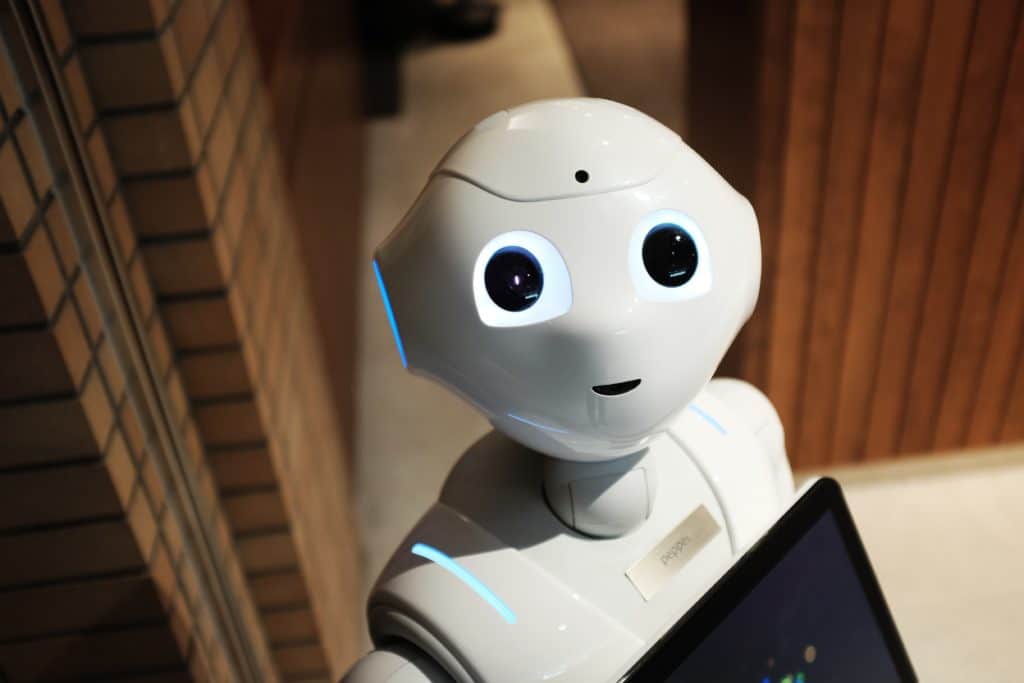
BY GILLES, MENTOR ON MY JOB GLASSES, TEACHER AND INFORMATION SYSTEMS CONSULTANT
Click here to contact him on My Job Glasses!
Will robots take away our jobs and condemn us to idleness with all its negative consequences?
Some of us may fear this, tempted to be carried away by the impulses of certain authors who no longer see much hope for human beings. But we can also lean towards a completely opposite vision of the future: robots would not function without humans, so a complementarity would be established for the greatest wellbeing of Humanity. This seems to be particularly true in these very difficult times we are currently experiencing. Robots can help us to get back on track and move forward on several different areas that will be discussed in this article.
ROBOTS KILLED THE RADIO STAR… OR MAYBE NOT!
Robots that create music exist already, but does that mean the role of the human composer is threatened? Not at all. At most, robots are able to produce audible songs on an industrial scale that are played in large quantities in trendy bars and discos. There are tools such as the Amper programme developed by Drew Silverstein, that can produce music almost autonomously. However, as Mr. Silverstein states: “Human creation and human musicians will not disappear. We’re just trying to make it so that spending 10,000+ hours and thousands of dollars is no longer a necessity to share and express ideas.”
This kind of innovation puts creativity within everyone’s reach, creativity is not reserved for a few gifted geniuses anymore. This is confirmed by Taryn Southern, a veteran of the television show “American Idol” and a fervent Amper user, who managed to produce a complete album with this tool. As she explains, humans still play a dominant role in music creation. Music co-created by men and machines is becoming more and more common, proving there is a complementarity between what humans can teach machines and what machines can bring to humans.
Nevertheless, a robot has no musical taste and relies on human ears to confirm what does sound good. When harmonizing a song, for instance, there are several important rules to follow and different possibilities to choose from. Overall, it’s the human composer that will listen to what sounds best to choose the right chord to reach the audience’s heart. Since the robot has no musical ear or sensitivity, it needs the human being. Talent can be imitated, composed by artificial intelligence algorithms based on various past creations, but real talent is inimitable. There is something unpredictable about it that is linked to an inspiration that the machine cannot have. Simply because whatever Hollywood wants us to believe, robots do not love, do not hate, are void of desire and do not fear death…
Robot musicians usually get their inspiration from massive databases that contain millions of songs from the last 6 or 7 decades. Whereas human composers will constantly look for an extra something to express their human emotions. This is what French composer and singer Michel Berger called: “the soul touch”. Through their creations, humans will be able to leave a recognisable imprint that will last for years, even centuries.
ROBOTS DON’T LEAD THE DANCE
Music composition is not the only artistic field we find robots in: we can also see robots dancing in a troupe such as that of the choreographer Blanca Li, creator of the show “Robot”. First created in Montpellier in 2013, this show moved to London in February 2017. Blanca considers that without humans, robots are nothing, they rely entirely on humans. She believes that watching robots dance alongside humans in harmony, allows the audience to be less afraid of machines.
Human beings are still essential to design the initial programme. The human dancer adapts to the robot’s moves and viceversa (the robot using its sensors to do so). A real complementarity is established. This helps us to understand why Blanca Li was appointed President of DICREAM in June 2020.
THE EMERGENCE OF ROBOTS IN THE RETAIL SECTOR
Robots are even appearing in shop windows, notably in Japan, performing choreographies to capture the attention of customers and adapting their expressions and gestures to the audience’s reactions. This is the rise of a new way of communicating and acquiring new customers! Numerous jobs could thus be offered for the creative people who will have to design the choreographies and animations. And France seems to be well on the way to this technological innovation!
THE IMPARTIALITY AND RAPIDNESS OF ROBOTS AT THE SERVICE OF THE LEGAL SECTOR?
We should see more and more “robot lawyers” helping legal professionals in their research of jurisprudence, which can be extremely time-consuming and costly. They can perform sophisticated legal searches with more precision and exhaustivity than any human employee. While robots take care of these administrative tasks, the lawyer will devote his time to pleading, conciliating and negotiating, all of which demand human skills. Robots will gather and manage large quantities of personal data and will be able to take decisions. These decisions will often be moderated by humans, who will decide to add an ethical approach to the legal analysis and will thus retain an essential role.
These same principles apply to other professionals such as accountants, solicitors and many others.
THE RISE OF THE INSPIRATION SOCIETY
The robot era could be seen by humans as a fantastic opportunity for personal development that does not exclusively focus on expressing one’s strength, speed, or power. The health crisis that we are experiencing will be the lever for a new awareness and should inevitably lead to a reconsideration of many values. In other words, we could move from a consumer society to a society of inspiration. A shift from a world focused on information and performance to a world of sensations, with production increasingly being carried out by robots. Innovations always emerge when humanity needs them.
Robots would thus appear as a new category of beings, between animals and humans. Depending on how they are perceived, they could be considered by some as assistants, by others as true companions. But even if they are present to protect us, the most likely and desirable consequence is that robots will contribute to the development of the talents of those who use them. This may be one of the few chances for human beings to avoid being overtaken by machines that will always lack intuition and the capacity of feel any pain or pleasure. Society will move to a reality where talent, intelligence, and discernment will be the most required skills.
Want to chat with Gilles about the future of the workplace in the robot era?


